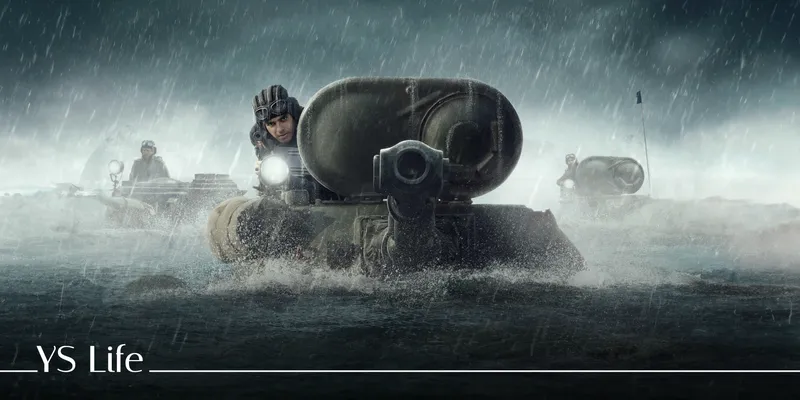Plodding pace slows Pippa down but Ishan Khattar shines in this coming-of-age drama on a less-explored war
Pippa highlights the tactical use of tanks and the bravery of India’s soldiers in the 1971 Bangladesh Liberation War.
Starring: Ishaan Khattar, Mrunal Thakur, Priyanshu Painyuli, Soni Razdan, Chandrachoor Rai, Soham Majumdar, and others.
A war film is meant to be rousing and emotional. Pippa, despite its eye for detail and sincere effort, doesn’t hit you in the gut. However, it does bring to the fore a less visible but significant moment from India’s postmodern history.
Set during the 1971 Bangladesh Liberation War, Raja Krishna Menon’s film presents a promising young actor with the potential to be the leading man of Hindi cinema in future–Ishaan Khattar.

Killers of the Flower Moon re-ignites the conversation around Hollywood’s take on native America
Pippa is based on the book The Burning Chaffees: A Soldier’s First-Hand Account of the 1971 War, by Brigadier Balram Singh Mehta. Mehta was part of the 45th Cavalry, a specially trained unit of the Indian Army that could manoeuvre the first amphibious tanks of our country. The unit named these vehicles ‘Pippa’ after the Punjabi term for a container of ghee because they could float on water.
Balli or Balram (Khattar) is among the best in commanding a Pippa but he has a tendency to overlook discipline. His elder brother Ram (Priyanshu Painyuli) is a serious, efficient army major, who’s always chiding his younger brother for not being a grown-up. Their sister Radha (Mrunal Thakur) is studying to become a doctor and has a knack of cracking codes. Their mother (Soni Razdan), a widow of a war hero, is weirdly addressed as ‘Maati’. The family is patriotic but tends to judge Balram for being irreverent.
As atrocities by the Pakistani Army pile up in Bangladesh and refugees crowd Bengal’s borders, the Indian government figures out a way to push the Pakistani troops back and launch a full scale attack to help the Mukti Bahini, the Bangladeshi forces. The march will end when the Bahini takes Dhaka; and it begins in the crucial Battle of Garibpur on the Indo-Bangladesh border.
The story focuses on Ram being posted at the front. Balram, disciplined for some time after his insubordination but having proven his value in this strategic battle, also joins the front, leading the 45th Cavalry with the Pippas set to fight a war in a land of rivers. And their sister too actively joins the war effort. Eventually, Balram wins a complicated battle through difficult terrain by attacking a Pakistani army camp, rescuing people, and coming out victorious.
Director Menon, who co-writes the film with Tanmay Menon and Ravinder Randhawa, has delivered the coming-of-age tale of Balli effectively.
Khattar fits the role like a glove, insouciant when needed and upright and deadly when in charge. He looks the part and carries off the element of a rebellious boy with ease. He promises to be an actor worth watching out for in future.
Thakur is competent as the caring and friendly sister, while Razdan does a fair job as the mother.
Painyuli is impressive as the dour faced but determined army officer, a contrast to his younger brother’s easy persona.
AR Rahman’s score is decent, though uneven, with the highpoints being the rousing battle song, Rampage (Rahman, MC Heam, and Krystal), and the adaptation of the Bengali song Karar Oi Louho Kapat (Tirtha Bhattarcharjee, Rahman, and Rahul Datta).
Pippa slackens in pace when the narrative moves into the crucial pre-conflict and conflict scenes. Usage of lumbering tanks while saving people burdens the story somewhat. The approach of the filmmaker, who has treated this like a procedural in some parts, dilutes the emotional highs of a war drama.
The trauma of locals in Bangladesh, limited to animation and a few lines of text, has been given very little attention. Sure, India took on this battle to prevent a genocide, as the noble soldiers tell their men.
The suffering of millions of Bangladesh residents led to a refugee exodus into India’s eastern frontier. India’s response was far more than a humanitarian one. Creating Bangladesh was a geopolitical victory for a young democracy like India. It was strategic and an action of leadership from the country.
Presenting a personalised take on the suffering of people in Bangladesh would have given a stronger emotional core to the reason for fighting this war in a foreign land. The landing of Pippas in difficult terrain makes for a visual delight but dramatic responses to the actions of Indian soldiers have limited effect on the viewer.
While the Bangladeshi characters interspersed in the narrative are important to this story, some of them overact and mess up the region’s accent. The most authentic part of the movie are the locations where it is filmed–similar to the green and riverine landscape of the silt-laden plains of Bangladesh.
The producers of this film, RSVP and Roy Kapur Films, have to be commended for backing a war-based tale that has an intellectual approach rather than a pseudo patriotic tone. The research shows on screen.
Pippa is a decent break from the hyperbole around brave Indian soldiers, though it’s a tad slow.
Worth a watch this holiday weekend.
Rating: 3.5/5
Edited by Swetha Kannan







